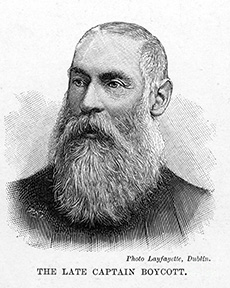Learn about the history of the Palestinian struggle for freedom, equality and justice by exploring major events in the history of their oppression on this day of the year.
1 December
 HOW CAPTAIN BOYCOTT WAS DEFEATED
HOW CAPTAIN BOYCOTT WAS DEFEATED
On this day in 1880, the eponymous Captain Boycott left Ireland after working as a land agent for Lord Erne in the Lough Mask area of County Mayo. In resisting proposed evictions of tenants from the estate, the Irish National Land League organised Boycott's employees to withdraw their labour. Orangemen from County Cavan came to harvest the crops, protected by the 19th Royal Hussars but the cost of harvesting £500 worth of crops was estimated to be in the region of £10,000. Boycott entered to vocabulary.
كيف تم هزيمة كابتن بويكوت
1 ديسمبر
في مثل هذا اليوم من عام 1880 ، غادر المدعو كابتن بويكت أيرلندا بعد أن عمل وكيل أرض للورد إرني في منطقة لوف ماسك في مقاطعة مايو. لمقاومة عمليات إخلاء ألمستأجرين المقترحة من العقارات والارض ، نظمت رابطة الأراضي الوطنية الأيرلندية موظفي بويكت لسحب عمالهم. جاء رجال أورانج من مقاطعة كافان لحصاد المحاصيل تحت حماية الفرسان الملكي التاسع عشر ولكن تكلفة حصاد ما قيمته 500 جنيه إسترليني من المحاصيل قدرت قيمته في حدود 10000 جنيه إسترليني. دخلت كلمة المقاطعة معجم المفردات.
At the time, Ireland was still a long-suffering, the longest suffering, colony of Britain. As in Palestine, as in any colonial project, dispossessing the native people was a central issue. A few months earlier, Irish Nationalist leader Parnell gave a speech in Ennis, County Clare to a crowd of Land League members.
The number of evictions of Irish farmers by English landlords in Ireland grew hourly greater and the agitation of the Land League against them; outrages, too, were of common occurrence and increased in intensity.
"What are you to do," Parnell asked the crowd, "to a tenant who bids for a farm from which another tenant has been evicted?"
Several voices cried: "Shoot him!"
"I think," went on Mr. Parnell, "I heard somebody say 'Shoot him!' I wish to point out to you a very much better way...When a man takes a farm from which another has been unjustly evicted, you must shun him on the roadside when you meet him; you must shun him in the shop; you must shun him on the fair-green and in the market-place, and even in the place of worship, by leaving him alone; by putting him into a sort of moral Coventry; by isolating him from the rest of the country, as if he were a leper of old - you must show him your detestation of the crime he has committed." This speech set out the Land League's powerful weapon of social ostracism, which was first used against Charles Boycott.
Many of his servants were forced to leave "under threat of ulterior consequences" and labourers left the fields after Land League activists visited them at their work. Eventually, all Boycott's employees left, forcing him to run the estate without help. The local blacksmith, postman, and laundress stopped serving Boycott. When his young nephew volunteered to act as postman, he was intercepted on his route and told that he would be in danger if he continued. Soon, shopkeepers in Ballinrobe stopped serving Boycott, and he had to bring food and other provisions by boat from a distance.
Fifty 'Orangemen' (anti-Catholic Empire loyalists) travelled to Lord Erne's estate to harvest the crops, protected by a regiment of the 19th Royal Hussars and more than 1,000 men of the Royal Irish Constabulary. The effort was estimated to have cost the British Government and others at least £10,000 to harvest about £500 worth of crops. Boycott left Ireland shortly after and the Land League became stronger. Boycotting had strengthened the power of the peasants, and by the end of 1880 there were reports of boycotting from all over Ireland.
Parnell and other Land League leaders were quickly put on trial on charges of conspiracy to prevent the payment of rent. The trial attracted thousands of people onto the streets outside the court and the judge dismissed the jury, it having been hung ten to two in favour of acquittal.
Boycott was a popular strategy developed by the Irish fighting against evictions, dispossession. Today, boycott is strategy developed by the Palestinians to fight their dispossession but in this case it is world-wide in scope. If enough people join and fight, it can again be victorious in this anti-colonial struggle. Ireland was the world's oldest colony; Palestine may be the last.
1-minute video from 1847 Holywood film: Stewart Granger as an Irish agaitator warning Captain Boycott
